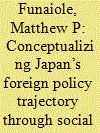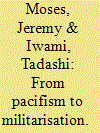| Srl | Item |
| 1 |
ID:
145143


|
|
|
|
|
| Summary/Abstract |
Regional security studies of the Asia-Pacific commonly center upon China’s rise, leaving other actors underresearched. Among these is Japan, whose ongoing reinterpretation of its pacifist constitution may destabilize the region. This article employs Social Identity Theory, a social psychology theory of group behavior, to develop a unique framework that accounts for both the domestic and international constraints acting upon Japan’s foreign policy makers. By analyzing Japan’s foreign policy evolution through the lost decade of the 1990s into the changed landscape of the post-September 11th world, this article identifies a prevailing trend toward “normalization”. It is argued that Japan is on course to further distance itself from the pacifism embodied in Article 9 of its constitution.
|
|
|
|
|
|
|
|
|
|
|
|
|
|
|
|
| 2 |
ID:
086622


|
|
|
|
|
| Publication |
2009.
|
| Summary/Abstract |
The pacifist commitment contained in Article 9 of the Japanese constitution has long been a source of scholarly interest and debate. While the insertion of the clause in the post-Second World War constitution was originally justified by General MacArthur (amongst others) as an expression of the 'high ideals' of liberalism and democracy that Japan was now embracing, it has since been derided as an impediment to effective Japanese participation in wars fought by the United States that are claimed to be in defence of freedom and democracy. This reversal of liberal logic became evident in the early years of the Cold War as Japan was encouraged to support the US in the Korean War and has strengthened in the years since. From the first Gulf War of 1991, up to the current War on Terror, much has been made of the constraints that Japan faces in supporting the 'defence of freedom' on a global scale. This paper aims to show the place of liberal discourses in relation to the pacifist clause in order to highlight the great ambiguity and inconsistency that exists in liberal claims concerning the promotion of peace in international affairs. In the context of tensions over Taiwan and North Korea, as well as the potential for controversial 'humanitarian' roles for the Japanese military in the South Pacific, these normative questions aim to shed light on the potential dangers of Japanese remilitarisation on liberal-internationalist grounds.
|
|
|
|
|
|
|
|
|
|
|
|
|
|
|
|